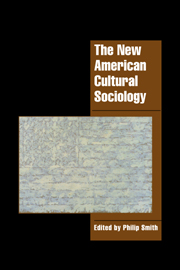Book contents
- Frontmatter
- Contents
- Notes on contributors
- Preface
- The new American cultural sociology: an introduction
- PART I Culture as text and code
- 1 Textuality and the postmodern turn in sociological theory
- 2 The computer as sacred and profane
- 3 AIDS and the discursive construction of homosexuality
- 4 Fundamentalism and liberalism in public religious discourse
- 5 Analytic and concrete forms of the autonomy of culture
- PART II The production and reception of culture
- PART III Culture in action
- Index
- Title in this Series
1 - Textuality and the postmodern turn in sociological theory
Published online by Cambridge University Press: 18 January 2010
- Frontmatter
- Contents
- Notes on contributors
- Preface
- The new American cultural sociology: an introduction
- PART I Culture as text and code
- 1 Textuality and the postmodern turn in sociological theory
- 2 The computer as sacred and profane
- 3 AIDS and the discursive construction of homosexuality
- 4 Fundamentalism and liberalism in public religious discourse
- 5 Analytic and concrete forms of the autonomy of culture
- PART II The production and reception of culture
- PART III Culture in action
- Index
- Title in this Series
Summary
Over recent years the “rhetorical turn” has become an important intellectual movement in the human sciences. It has become a commonplace that social and cultural reality, and the social sciences themselves, are linguistic constructions. Not only is society viewed increasingly as a text, but scientific texts themselves are seen as rhetorical constructions. In this rhetorical view, reality and truth are formed through practices of representation and interpretation by rhetors and their publics. This view can be located in the contexts of poststructuralism, critical rhetoric of inquiry, and the social construction (and reconstruction) of science. All these tendencies of thought reject the simple bifurcation of reason and persuasion, or of thought and its expression. Instead, knowledge is viewed as poetically and politically constituted, “made” by human communicative action that develops historically and is institutionalized politically.
In this view, realistic representations become true descriptions not by correspondence to noumenal objects, but by conformity to orthodox practices of writing and reading. Thus theories can be seen as the practices through which things take on meaning and value, and not merely as representations of a reality that is wholly exterior to them. Indeed, insofar as a theoretical representation is regarded as objectively true, it is viewed in that way because its methods of construction have become so familiar that they operate transparently (Shapiro 1988, p. XI). For example, if we show a chart and call it “Income Distribution in the United States,” we assume that the chart has a certain equivalence with things that people have or do.
- Type
- Chapter
- Information
- The New American Cultural Sociology , pp. 19 - 28Publisher: Cambridge University PressPrint publication year: 1998
- 2
- Cited by

